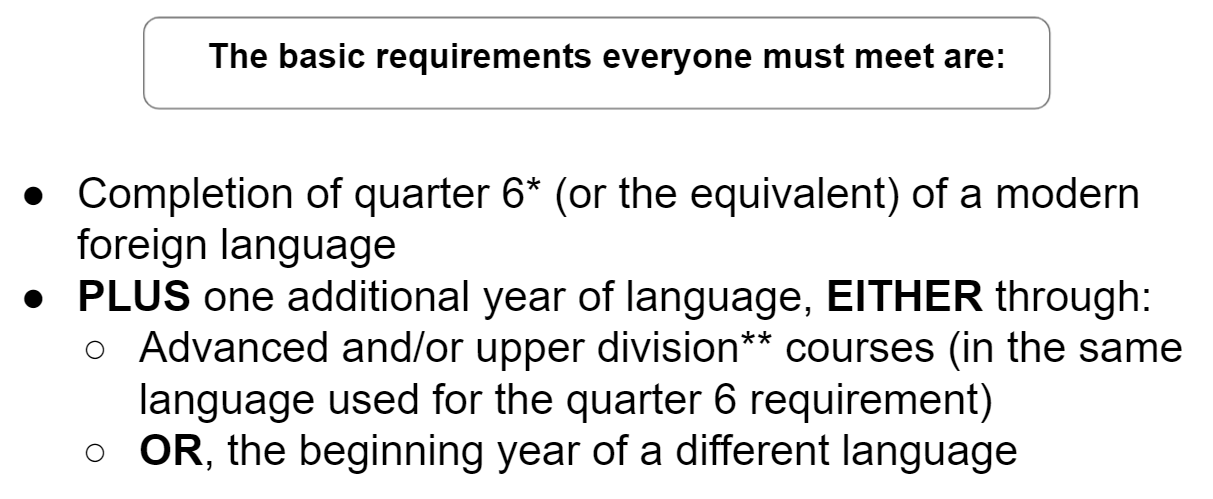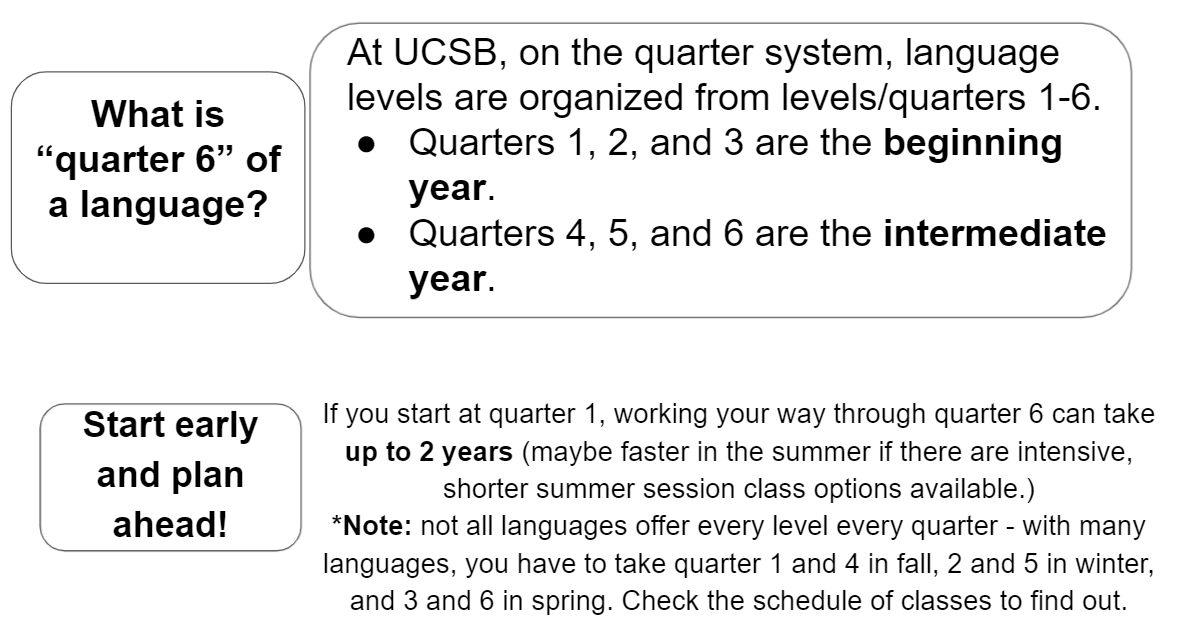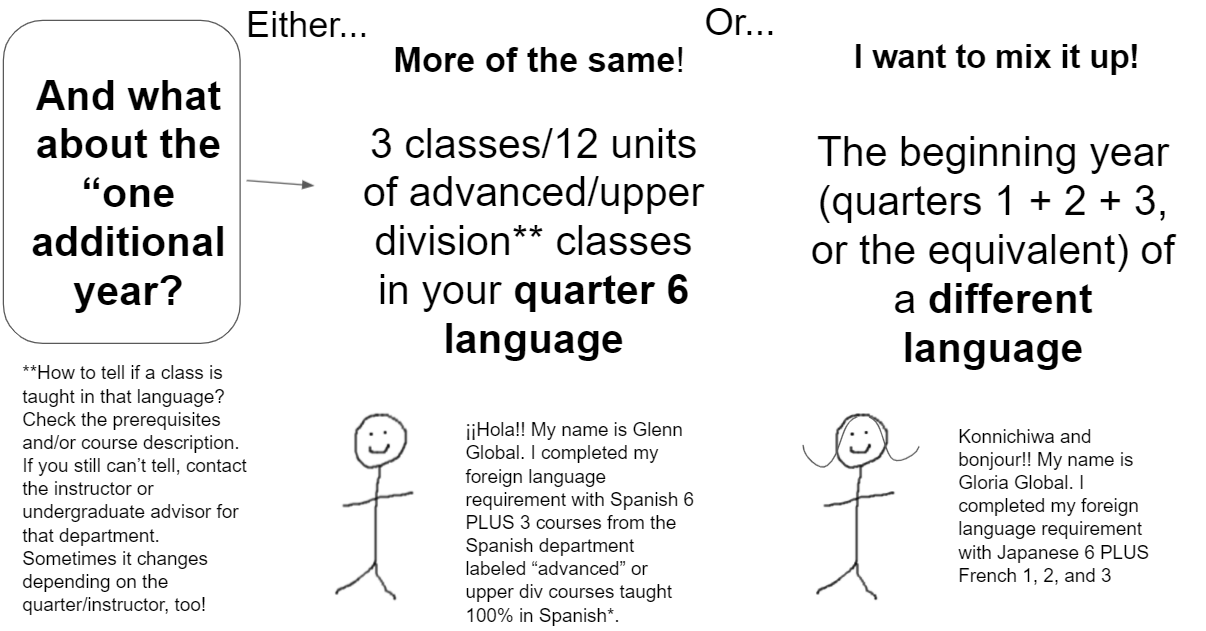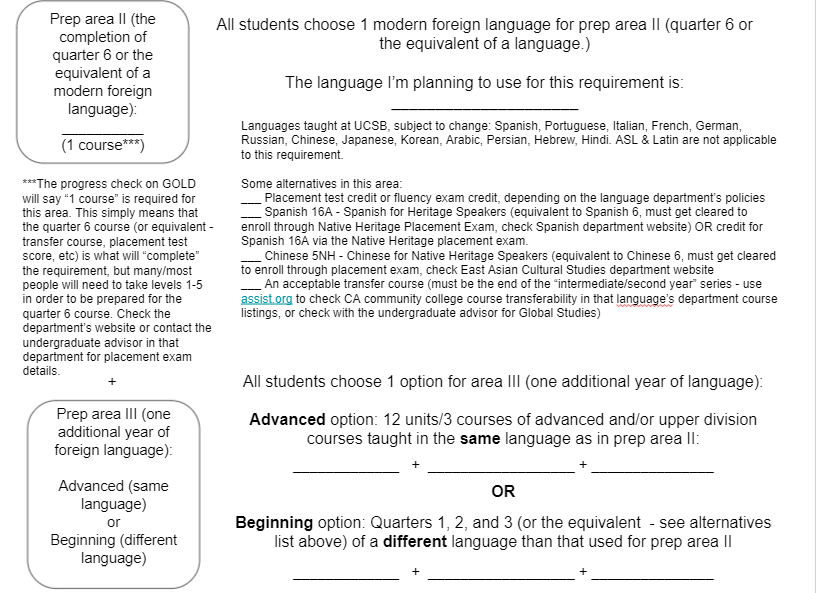A truly "global" major experience
**PLEASE NOTE: The following information outlines the foreign language requirement specfically for UCSB's Global Studies major. If you are a current or prospective UCSB student not intending to pursue a Global Studies major, we recommend you visit this page and scroll down to the section about the Area B GE requirement, which is the more general foreign language requirement for all UCSB students.
The Global Studies major foreign language requirement is the subject of one of our most frequently asked questions! If you are confused by it, you are not alone. Complicating things is that there are a lot of individual student situations that you might want to take into account as you consider how you want to complete this major requirement.
We invite you to visit our YouTube channel for a full video that explains the requirement and goes through some student situations that may apply to you (if you have studied a language previously, if you are a native speaker of another language, etc.) We'll go over some highlights on this page, and we welcome you to check your Major and GE Progress Check (under the Progress tab on GOLD) and contact us (see our advising contact page here) if you have questions about your individual situation as a student.
If you are a native speaker of Spanish or of Chinese, please pay special attention to the section below entitled "Special Notes for Native Speakers"!
The General Education (Area B) requirement for all students at UCSB requires 1 year of beginning-level college language study, which can be completed in a variety of ways (outlined here.)
The Global Studies major challenges students to go deeper, to consider the world from multiple perspectives, and to be truly prepared to communicate within an increasingly connected global community, so we require a minimum of what amounts to 3 years of college-level foreign language experience. This is not a great major choice for students who do not enjoy learning languages!
Students can choose to complete these 3 years of language study through:
- 3 years of one language, completed to an advanced level of college language study (including through upper division courses taught in that language), OR
- 2 years of one language, completed to an intermediate level of college language study PLUS 1 year of a different language, completed to a beginning level of college language study
However, we know that many students have either studied another language previously (perhaps through high school or elsewhere), or are multilingual, perhaps as native speakers of another language(s) besides English.
Because of this, the major requirements do not necessarily require 3 years of coursework for all students; they just require demonstration of the skill level equivalent of 3 years (advanced level in one language, or intermediate level in one and beginning level in an additional one) of college-level language.
Put differently, here are a few diagrams taken from the foreign language FAQ (frequently asked questions) video to illustrate the basic requirements:



See below - this image is taken from our Global Studies major course planner, which allows students to plug in potential course options to see how they might choose different scenarios for completing the foreign language requirement:

Please note: students who are choosing the advanced language option for their one additional year should know that the courses they choose for this area very likely will need to be petitioned (see the petitions section for more information on how to do this), but as long as the course is labeled as advanced and/or is taught in that language and is upper division, it counts for this area.
We have a document (linked here) that outlines the current information for each language taught at UCSB - which classes count towards the "quarter 6" part of the requirement, which classes count towards the "one additional year" part of the requirement through either the "advanced in the same language" or "beginning in a different language" option - as well as some options if you are trying to take courses elsewhere (at a community college, at a different college, on a study abroad program, etc.)
The document is a set of Google Slides - plan to scroll through the slides until you get to the language you're looking for. You'll also notice there is a slide at the end of the document for options related to using a language not taught at UCSB for this requirement, especially if you are a native speaker.
For beginning and intermediate level courses, the course title will typically indicate the course's level, and the number sequence will help confirm that skill level:
- For example, levels 1-3 = beginning/elementary level
- Levels 4-6 = intermediate level
- Some departments (for example, Religious Studies) use unique numbering systems for their beginning/elementary and intermediate levels, so watch for that!
For advanced-level courses, you're looking for courses that are either labeled as "advanced" or are upper division courses taught in the language. How can you be sure that a course is taught at the advanced level (and can therefore count towards the advanced option for the "one additional year" requirement for the major)? Look for the following:
- Specific "advanced" labeling in the course's title/description (for example: Advanced Composition)
- Prerequisites of having completed level 6 or higher in that language
- Upper division courses taught in that language (for example: Spanish 100 is taught in Spanish; Spanish 139 (often) is not.) Read the course description carefully to verify.
Special note for Spanish and Portuguese department upper division courses: this department has created a form students can fill out if they'd like to take a Spanish or Portuguese course taught in English for major credit (when normally those courses would need to be taught in Spanish or Portuguese to count for the major.) The student and the instructor make a plan for the student to complete all work in Spanish or Portuguese. For Global Studies major credit, students can complete this form with their instructor and submit it when petitioning the course for the foreign language requirement.
In many cases, you might have something in your background as a student that can help credit you towards completing certain parts of the foreign language requirement (or, prior knowledge that lets you place into a higher level of that language if you want to continue studying it, or even prior knowlege that lets you test out of the requirement completely.)
Do any of these situations apply to you?
- I studied a foreign language in high school and reached at least the third year of study ("3 years of high school language") with a C or better in those courses
- I have AP exam credits (a score of 3, 4, or 5) in a language
- I'm a "native heritage" speaker - I'm (maybe) from the US but I grew up speaking a language other than English as my first language and it's still a pretty big part of my life now (I still speak it with family, etc)
- I attended high school (not just a year or two, and not just middle school) in a foreign country, where the language of instruction was not in English
- I'm an international student (and attended all of high school in a foreign country, where the language of instruction was not in English)
If so, we invite you to watch the foreign language FAQ video on our YouTube channel for more details on how these situations might allow you to demonstrate skill credit towards fulfilling some or all of the foreign language requirement.
You can find contact information for a langauge department (placement test information, etc) typically by Googling "UCSB + name of language + placement" and seeing what comes up. You can also check this document for some ideas of where to start. Please contact us if you are having trouble finding placement information for the language you want to study (or continue studying) at UCSB!
The big thing to know with all of the native speaker options listed above is that they do depend on contacting the department at UCSB that teaches that language (whether to complete a placement exam or a fluency interview) or requesting that your high school in your home country sends your transcript to the UCSB Office of Admissions.
This takes time and effort, and you're working with this other department or other office's process and their timeframe to clear the part(s) of the language requirement for which you're eligible.
So, if you think any of these options applies to you, you'll want to make that contact as early as possible upon joining the major so that you can avoid running out of time to complete the requirement, especially if you find that your situation doesn't quite cover as much of the requirement as you thought it would, or you need to get your high school to send a transcript, or the department isn't offering placement exams on the timeframe you'd need, etc. We cannot guarantee that you can complete the foreign language requirement in this way if you do not contact the department that teaches that language early enough in your time at UCSB, or if the department changes their process and you're no longer eligible for this option. Always check with the department for the most updated information.
- Native speakers of Chinese: please click here
- Native speakers of Spanish: please click here
- Native speakers of all other languages: this document has directions to follow that will help with this process - click through the slides until you get to the language you speak to see those options. If you speak a language not taught at UCSB, you'll want to look to the very last slide.
Please also reach out to us with any questions you might have about your individual situation in relation to the foreign language requirement.
In many cases, yes, you absolutely can use courses taken on study abroad programs to fulfill parts of the foreign language requirement (not the entire requirement, though.)
Studying abroad for a single quarter or semester will likely provide around half of a single year level of study; studying abroad for a full year will often allow you to complete an entire year's worth of skill level credit, but it depends on the program.
You'll want to look carefully at program options on the UCEAP website to see what programs would be a good fit for you depending on what "stage" of the requirement you'll be working on at the time you'll be abroad:
- Do you need beginning-level language options? Look for programs that have no language prerequisite and offer (or require) the chance to take beginning-level courses in that language
- Do you need intermediate-level language options (because you've already completed the beginning year at UCSB or through transfer credits)? Look for programs that offer (or require) the chance to take courses in that language and plan to take (or test into) intermediate-level courses
- Have you completed (or will you complete) quarter 6 - the end of the intermediate level - in a language and want to continue with that same language for your "one additional year"? Look for programs that allow you to take advanced courses in that language OR content courses in any subject, taught in that language (those count for the "advanced one additional year" option!)
It's not uncommon for Global Studies majors to get behind on language courses and need to seek alternative options. Though not a strongly recommended option, this is actually fairly common - students who need to catch up (especially if they've finished all other major and graduation requirements) or who want to get ahead might look into the following options.
At UCSB:
- Summer Sessions frequently runs "intensive" series of language courses in the more popular languages at UCSB (Spanish, French, and a few others) that may allow you to complete three quarters (1, 2, and 3, or 4, 5, and 6, depending on what the department is offering that summer) of a language in a series of shorter summer sessions (typically about 9 weeks total.) This is a great option for people who need to make up an entire year's worth of language but do not or cannot spend another full year at UCSB.
- Italian 16A and 16B AND Portuguese 16A and 16B are two course series that are open to speakers of Spanish - they both give the equivalent of quarters 1, 2, and 3 in that language, but go faster, and you get one full year's credit done in two quarter courses, on the assumption that the instruction can go faster since students in the course already have a strong background in Spanish
Away from UCSB (and then send a transcript to the UCSB Office of Admissions when you have a final grade on the course):
- Community colleges are a popular option for students who want to save money and go at their own pace after finishing everything else at UCSB! Or, maybe you're home for the summer and want to take language courses at your local CC to keep going, get ahead, or catch up. You can use assist.org to find the course(s) that count as the equivalent of the UCSB course(s) you are trying to fulfill
- Other 4-year colleges are an option, too (including UC Extension programs)! Just check with us to be sure the course(s) you're looking at are a good fit for the requirement and the part(s) of it you need to finish.
- BYU has a lot of independent study, online course options that can be taken for language credit. This could be a good option for you if you need to work at your own pace and are able to learn well independently!
Please do not hesitate to reach out to us using the contact information on our main Undergraduate Advising page.










